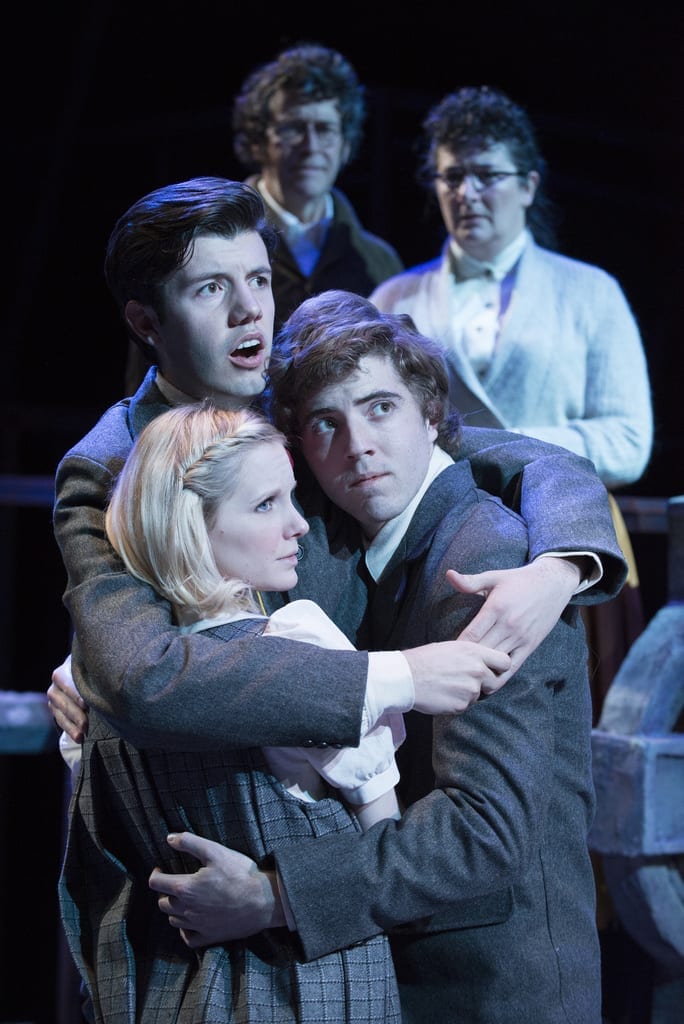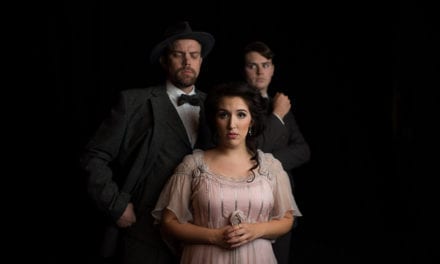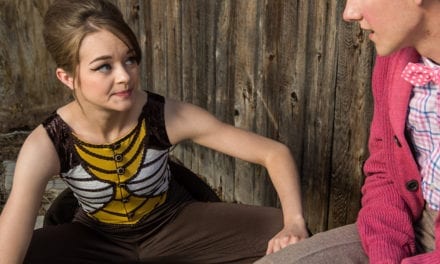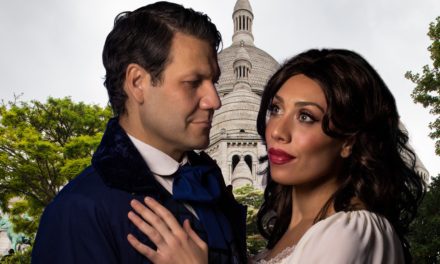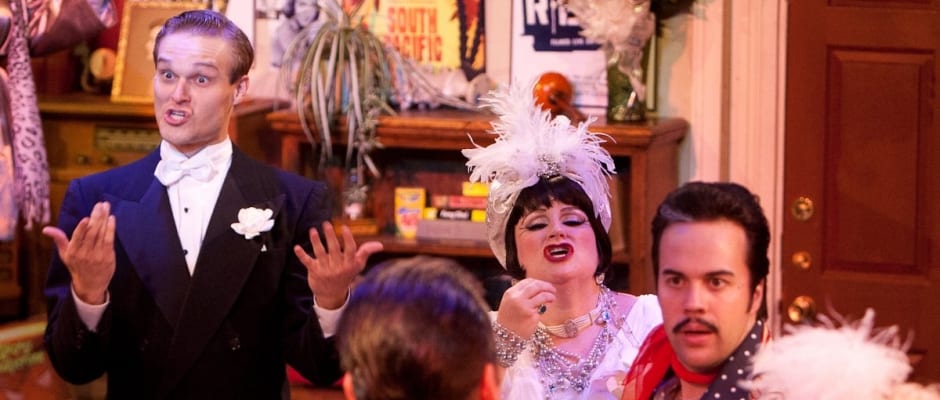SALT LAKE CITY — It is rare that a production comes together so flawlessly, where all elements work so in sync that the end result is breathtaking. Such was my experience at Spring Awakening. This Tony Award winning musical is in its first Utah production, which is also the first production directed by Denny Berry, the new head of the musical theatre program at the University of Utah. With a resume that includes Broadway credits such as the Broadway dance captain and production dance supervisor for the original productions of The Phantom of the Opera and Jesus Christ Superstar, locals are in for a treat to see Berry’s work in her debut production in Utah.
What really made this production amazing and must be noted first was Berry’s beautiful and brilliant directing and choreography, which seamlessly moved from scene to scene, creating interesting pictures, levels and stylistically created a sort of Greek chorus out of the ensemble and actors, even when performers were not involved in the scenes. This accented and visualized the consciousness and mood of the scene as the ensemble provided commentary through their bodies and movement of their individual feelings towards what was happening. The production also had a unique flavor, and was not a restaging of the original Broadway production, but a different concept entirely, though equally as successful.
Spring Awakening follows the lives of teenagers living in Germany in the late 1800’s, and is based on the German play with the same title that was banned in Germany for a long time because of the play’s open discussion of issues such as abortion, homosexuality, rape, child abuse and suicide. The story is told through rock music by Duncan Sheik and an adapted script and lyrics by Steven Slater. It is a coming of age musical dealing with teenage angst to the extreme and the dangers of parents who avoid discussions of sexuality with their children and parenting them without love and understanding.

Front, Jaron Barney as Melchior, Dylan MacDonald as Moritz, and Jackie Jensen as Wendla. Rear, Bob Nelson as The Adult Men and Sarah Shippobotham as The Adult Women. Photo by Spencer Sandstrom.
The adults essentially were the antagonists of the show. Each of the many adult characters was represented as flawed, uncaring, and harsh villains that were impeding, controlling and punishing the protagonists of the story, which collectively represented the young teenagers. Berry created two unique worlds—the adult world, one of darkness, intolerance, and hypocrisy that was at war with the teenage world, one of questioning, innocence, and love. The transition between these two worlds was often made through songs in which the teenagers break into a modern day rock concert, commenting on the behavior and their treatment by the adults. This dramatic technique was fully developed, with microphones and contemporary dance techniques and styles to aid this convention.
The acting was honest and raw. What I especially liked about the actors is how well they functioned as an ensemble, working together unselfishly to share a powerful story. The actors put their heart in soul into each number. “The B— of Living,” “Touch Me,” and “Totally F—ed” were especially strong numbers and the choreography was creative and fresh. Leah Hassett as Thea and Corbin Russell Schmidt as Ernst/Reinhold were often featured as lead dancers in the numbers, and it was fascinating to watch how beautifully they danced together.
Not only was the dancing well executed and creative, but also it added another layer in the storytelling and progression of the plot and themes. The entire cast supported one another, never upstaging or pulling focus from the story, though at the same time creating very distinct characters that added a nice variety and shape to the many group scenes. My favorite actor of the night was Dylan MacDonald as Moritz. MacDonald’s intense portrayal of the role and emotionally driven solos were very moving. He embodied the frustrations of never measuring up to his parents and teachers’ demands while simultaneously discovering his sexuality brilliantly. This made Mortiz a ticking time bomb as he tried to get answers, support, and compassion from the adults, though his pleas for help were only met with chastisement, abuse and ridicule.
Cooper Howell as Hanschen/Rupert gave a captivating portrayal as Hanschen, the arrogant know-it-all. His discovery of his own sexuality was certainly taboo in this day in age, and Howell brought great comedic relief to this drama with his subtle choices and solid commitment to these choices. His self-stimulation scene was very funny, and his scene with Schmidt in “The World of Your Body” was especially successful as the two had great chemistry with one another.
The adult women, all played by Sarah Shippobotham, and the adult men, all played by Bob Nelson were flawless in their deliveries of the many roles they played. Each performer portrayed five or six different adult characters, including schoolteachers, parents, and administrators. I was amazed by the uniqueness that the two actors brought to each of the various roles and how easy it was to follow the many characters they were playing because of the distinctiveness that they gave physically and stylistically to each part.
Jackie Jensen brought a believable innocence and naivety to Wendla and had a gorgeous voice. Occasionally her focus was a little high making her a little harder to connect with, as she appeared to be looking up a lot. I would have preferred her to shift her focus a little lower so the audience could feel more included. Jesen was matched nicely by Jason Barney as Melchior, and there were two scenes that were especially successfully between them. The first was their scene in the woods where playful spanking lead to uncontrollable passion. The second successful scene was in the barn at the end of Act One when they first have sex. Barney also had great vocals and did a nice job as the intellect that questioned the controlling practices of the day and rebelled against traditions that could not be supported with fact or reason. I would have liked to see a little more risk in Barney’s choices. Though very good, I wanted more from him, and I felt he played his role a little too cautiously. Such risks would give greater depth to the character and a greater edge and ruggedness that is needed in Melchoir. Barney came across a little too proper and together. I wanted a few moments where Melchoir lost control and allowed passion to override intellect, giving a more dimensional portrayal.
Michael S. Johnson gave a nice performance as Georg/Dieter, providing some comedic relief in his discovery of sexuality and journey through puberty. The scene where he fantasized with his piano teacher was especially funny. Supporting characters Arielle Schmidt as Anna, Trevor Bair as Otto, Jessa Brock as Martha, Camille Johnson as Ilse ,and Austin John Smith. As the ensemble, these performers completed the cast nicely because of the individuality they brought to each of their supporting roles, in addition to the solid acting, strong vocals, and beautifully executed choreography they provided.
The design work by Kevin Dudley was fascinating—German expressionism accentuated the theme with harsh rusty metal set pieces that made the stationary set serve a variety of places, locations, and levels. I especially liked the clunky metal bridge that served as the hallway to the headmaster’s office and the rope swing that symbolized love and discovery between each of the couples.
The band and music, under the direction of Alex Marshall, was very strong. However, the music had less of a rock feel and more of a musical theatre feel stylistically in both the solos and group numbers. This is more of a style choice, though I would have preferred more of a true rock feel to the vocals and orchestration and less traditional musical theatre vocal technique. I would have especially enjoyed less vibrato in the singing and stronger electric guitars and drums in the rock numbers, giving these pieces a more contemporary sound.
The University of Utah’s Spring Awakening is a heart breaking production, brilliantly and beautifully directed with a talented cast and crew. This is a rare opportunity to see this thought provoking and critically acclaimed musical. Its stunning relevance in Utah society is particularly important and viewers young and old will relate to the characters and material in this story, as well as be touched by the beautiful music and message that needs to be shared and talked about.

